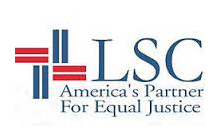Proposed House FY 2024 Budget Would Devastate Access to Civil Legal Aid
 This morning the House of Representatives Appropriations Subcommittee released a proposed budget for FY 2024 that would have a devasting impact on civil legal aid throughout the United States. The House Subcommittee’s proposed budget cuts the Legal Service Corporation’s (LSC) funding by $71 million to $489 million.
This morning the House of Representatives Appropriations Subcommittee released a proposed budget for FY 2024 that would have a devasting impact on civil legal aid throughout the United States. The House Subcommittee’s proposed budget cuts the Legal Service Corporation’s (LSC) funding by $71 million to $489 million.
This cut means that 272,248 fewer low-income people would receive legal assistance on life-impacting matters such as evictions, veterans benefits or domestic violence. LSC grantees would be forced to turn away 117,883 children, 24,503 survivors of domestic violence and 4,924 veterans.
On Thursday, the Senate appropriations committee released an FY 2024 budget that keeps LSC funding at $560 million, reflecting the compromise embedded in the Debt Ceiling Agreement to fund the federal government at the FY 2023 level.
In March, LSC requested an appropriation of $1.5 billion for its FY 2024 budget. This request accounts for the increase in demand for civil legal services due to the persistent impact of COVID-19 on low-income Americans, coupled with the ongoing lack of adequate resources to address the widening justice gap.
Across the country, the 131 legal aid organizations funded by LSC urgently need resources to assist people facing civil legal problems that jeopardize their well-being, including evictions, foreclosures, domestic violence and issues with unemployment insurance and consumer scams. These organizations are a buoy for families, senior citizens, veterans, people with disabilities and those recovering from disasters or the opioid epidemic.
Without sufficient funding, the capacity of legal services providers will continue to fall short of the needs of low-income Americans. LSC’s 2022 Justice Gap report—which details the difference between the civil legal needs of low-income Americans and the resources available to meet those needs—found a staggering deficit. LSC’s grantees must turn away half of eligible clients who seek civil legal services due to a lack of resources.
In FY 2023, Congress appropriated $560 million for LSC, increasing its budget by $71 million over the previous year’s funding level.
“We are grateful for Congress’ long history of bipartisan support for LSC—the additional resources they provided in FY 2023 allowed greater investment in the vital work of civil legal aid providers in every U.S. state and territory,” said LSC President Ron Flagg.
“However, in the wake of decades of chronic underfunding of civil legal aid and as the needs of low-income Americans continue to increase, we must stay the course,” Flagg continued. “To roll back resources for legal aid intervention now does these 50 million Americans a great disservice and imperils progress toward equal access to justice.”
Individuals who have a household income at or below 125% of the Federal Poverty Guidelines are eligible for LSC-funded legal assistance. In 2023, this corresponds to annual incomes below $37,500 for a family of four or $18,225 for an individual. According to the latest data, nearly 53.7 million Americans qualify for LSC-funded legal services.
Notably, after falling every year since 2015, the eligible population increased in both 2020 and 2021 due to additional economic hardships related to the COVID-19 pandemic, indicating that impacts of the pandemic are remaining or worsening for many Americans. After an initial emergency appropriation of $50 million in March 2020, LSC did not receive any additional COVID-19 supplemental emergency funding to address the legal and economic consequences of the pandemic on low-income Americans.
For the second year in a row, the Biden Administration put forward the largest ever White House request for LSC’s budget, topping its FY 2023 recommendation by $100 million to propose $800 million for LSC in FY 2024.
Legal Services Corporation (LSC) is an independent nonprofit established by Congress in 1974 to provide financial support for civil legal aid to low-income Americans. The Corporation currently provides funding to 132 independent nonprofit legal aid programs in every state, the District of Columbia, and U.S. territories.